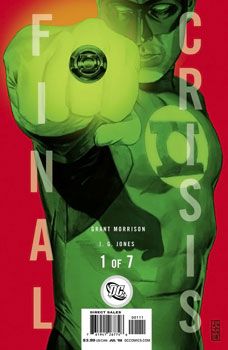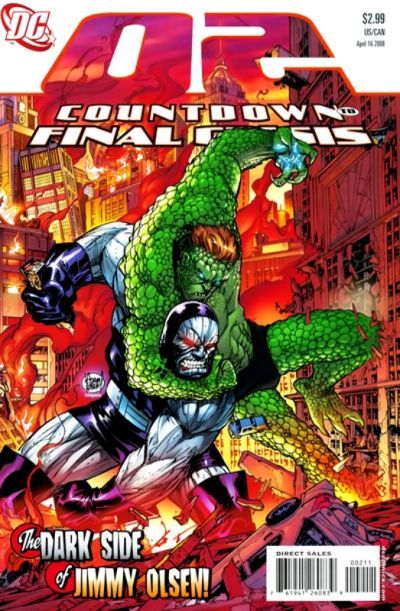Welcome to the first 2009 edition of Everyone's A Critic, now safely ensconced at its new home at Robot 6.
For those who aren't familiar with the series back when it was over at Blog@Newsarama, the object of this column is to offer germane discussion on comics criticism, macrame and similar lighthearted fare. OK, I was lying about the macrame part. That was just to draw you in.
Every so often I'll be poking out from my hidey-hole and offering my thoughts on a particular review-related issue of the day, pointing you towards an interesting discussion or review or talking with some of the industry's more intelligent and articulate pundits.
I say "every so often," because at this point, for a variety of reasons that I can't go into right now (I'm lazy, my big toe hurts), I don't have the ability to do the column as a biweekly, let alone weekly, thing. As things settle down it will, I promise, but for now it will more or less show up when I feel the discussion is germane enough. I like typing the word "germane."
Today I want to point you towards a lengthy discussion you may have noticed taking place a few days ago over at Sean T. Collins' site.
It all started when Collins posted a link to Tom Spurgeon's holiday interview with fellow critic Tucker Stone. Stone had said:
when you're working on the biggest super-hero character of the year, and your job is to do that characters big bestseller of the year, then that isn't the time for you to put out something that any Batman fan, even the dumbest one, calls "confusing."
To which Collins replied:
I don't know what it is about superheroes that occasionally draws this sort of thing out of critics, but you rarely see people demand that the big summer movie or the big autumn hip-hop record be more simplistic lest some people get turned off. Keep in mind that even though Tucker's not a fan of Batman: R.I.P. on a qualitative basis, that's not what he's talking about--this criticism would hold even if it were a great comic, as long as it was still confusing to some readers. That seems proscriptive and self-defeating to me.
And it was off to the races from there. Stone and Collins got into it (politely I should add) in the comments section. Here's Stone:
I do think it would benefit comics to have a bit more clear demarcation of where their Summer Crowd-Pleaser is going to be. With the super-hero stuff, a huge Batman epic event story--one that's going to get as much hype as DC is willing to give anything--that should be their tent-pole. Instead, it's an insular text that operated without connection to the books it's listed as being connected too, it appealed to the primarily Grant Morrison fan (instead of the primarily Batman fan) and I think that was a stupid call to make.
And here's Collins again:
I think you get into tricky territory as a critic when you start criticizing (or praising) material for how it does or doesn't function as commerce--to me that's an entirely separate issue.
That then led to another post by Collins wherein he attempted to explain in greater and better detail how he reads and critiques a crossover event like Batman R.I.P. or Final Crisis. The comments thread to that post then turned into a big foofoorah with folks like Tom Spurgeon and Kiel Phegley chiming in. The discussion even spilled out onto other blogs, with folks like such as Tim O'Neil, Dick Hyacinth and Mark Oliver-Frisch offering their thoughts.
So why all the ruckus? Well, it seems at the heart of the matter is two very different ways of thinking and writing about comics and, on a broader scale, art in general. I thought it might be useful to try to parcel the two views out and weigh their individual merits. My apologies in advance if I misinterpret anyone's statements.
Let's start with Collins. If I'm understanding him right, he's saying that when it comes to reading and critiquing a big superhero crossover event like Final Crisis or Batman R.I.P., the need to pick and choose -- to be selective, favoring the main storyline and ignoring say tie-ins like Rage of the Red Lanterns or Death of the New Gods -- is not only preferable but imperative to one's enjoyment of a particular book.
In other words, by not getting bogged down in a ton of needless esoterica, contradictory plots and inferior work (or at least, work that doesn't hit your particular sweet spot) you prevent yourself from being soured on the work you are interested and can focus solely on its own unique aesthetic merits. Don't let the existence of the Animatrix, or The Matrix Revolutions for that matter, spoil your enjoyment of the first film.
Sean's method is strikes me as something of an auteurist stance. I don't mean that as a slight; I'm simply saying he picks and chooses the books he reads because of his interest in a particular writer or artist, in this case, Grant Morrison. He might have a interest in Batman or the other DCU characters, but they're second to his interest in Morrison
I'm rather sympathetic to that stance because that's how I read a lot of these types of books myself. I refused to read any of the Secret Invasion tie-ins (the main series was bad enough) and I've tried to stay clear of a lot of the Final Crisis and Batman R.I.P., partly because of finances but also because I'm more interested in Morrison as a writer than I am in how these comics are "going to chance everything. What's more, I'm not convinced reading Paul Dini's "storyline from another world" in Detective Comics mattered in the long run in how I perceive Morrison's work.
So, yeah, I think Sean's methodology has merit, especially as a reader. It's when he starts suggesting it's a preferable method of criticism, particularly in relation to Stone's, that I think he falters. I'm very leary of saying one method of criticism is inherently superior to another in general -- I tend to think different methodologies can provide a fuller picture of a particular work or genre. Stone's take on Batman has merit, not the least of which being that it assesses the work in relation to the culture at large.
Because, let's face it. As much as we'd like to pretend that a work exists in a perfectly sealed vacumn once it comes off the printer's press, there are a thousand things, both economical and otherwise, that influence our perception. The Godfather is still one of my favorite movies of all time, but I'd be lying if I didn't say that remembering the mere existence of The Godfather III has never soured my enjoyment. And don't get me started on those last three Star Wars films.
So let's move on to Stone. I think a couple people misinterpreted his comments, feeling that he was suggesting that any work of art had to "dumb it down" in order to appeal to mass audiences and that this was a commendable goal.
I don't think that's what he was saying at all. I think (and again, perhaps I'm wrong) he was saying that if you have a popular character like Batman, who is currently starring in one of the biggest blockbusters of the year, and your big Batman comic book crossover event, which you're heavily hyping, is not only so esoteric and bewildering to confuse casual readers, but has a horrible anti-climatic ending that continues in another series and features art by a guy who can't draw a fist connecting with a face, well that's just plain stupid.
No, Stone is not necessarily addressing the success (and let's not forget that Batman R.I.P. was one of DC's biggest successes of 2008) of the series on the same aesthetic grounds as Collins. He's taking it purely from DC's standpoint, which is they wanted a tentpole event that could draw in folks from far and wide around and lead them to purchase other DC comics, like Final Crisis. Despite the sales numbers, he's saying they failed utterly on those terms because the audience that did tune in quickly grew frustrated and confused and might not make a second attempt.
Of course, I'm doubtful that DC honestly ever considered Batman R.I.P. to be the general crowd-pleaser Stone thinks it should have been. I think that was definitely aimed squarely at the fans, the regular readers. I think the recent Brian Azzarello Joker graphic novel intended to serve that purpose instead, and while it may not have reached Watchmen numbers, it looks like it may have served its purpose.
Sure, there are problems in attempting to form hypothesis about whatever the mythical "mass audience" wants, but I think it's perfectly valid to criticize a work in the larger context of whether or not it succeeded at its own modest goals, even its economic ones. There are a number of critics who steadfastly refuse to engage a work solely on its own terms but place (or mock) it within its relationship to the culture at large or as pure product. (Anthony Lane of The New Yorker comes immediately to mind.)
In the end, I think it's extremely valuable to read an assessment like Stone's on whether or not FC or what have you succeeds as product. Because let's face it, DC regards it ultimately as a product (hopefully an entertaining product, sure, but product nonetheless). It's just as valid to castigate a comic for failing to meet its demands for its intended audience as it is to praise it for its own particular set of aesthetic qualities.
But I also think Collins' view is whwhile since he comes at it from a different set of criteria. Asking whether the work is intellectually or emotionally satisfying is very important to me as a reader. I want to know what Sean thought of the book. But I also want to be able to garner a wider viewpoint without fling like I'm slumming or being a "reverse-snob."
So in short, everybody wins. Can I go home now?





